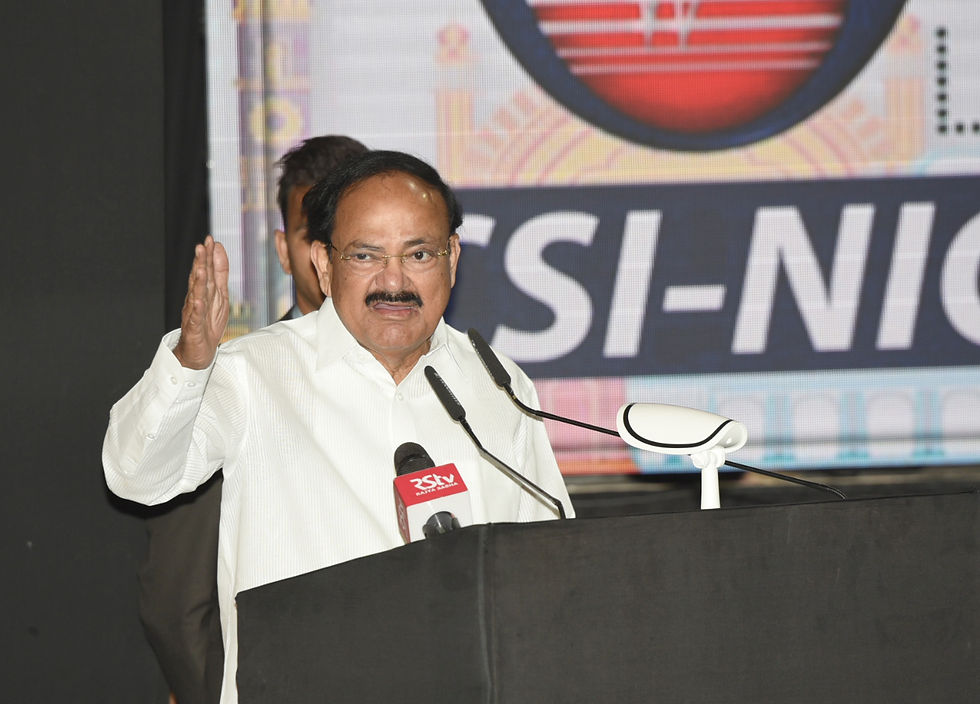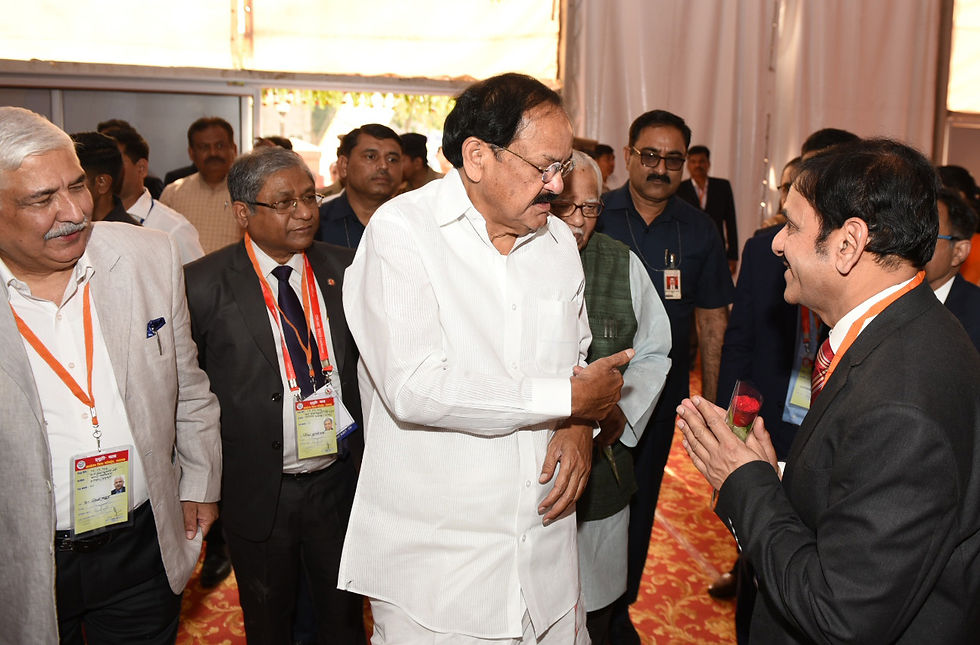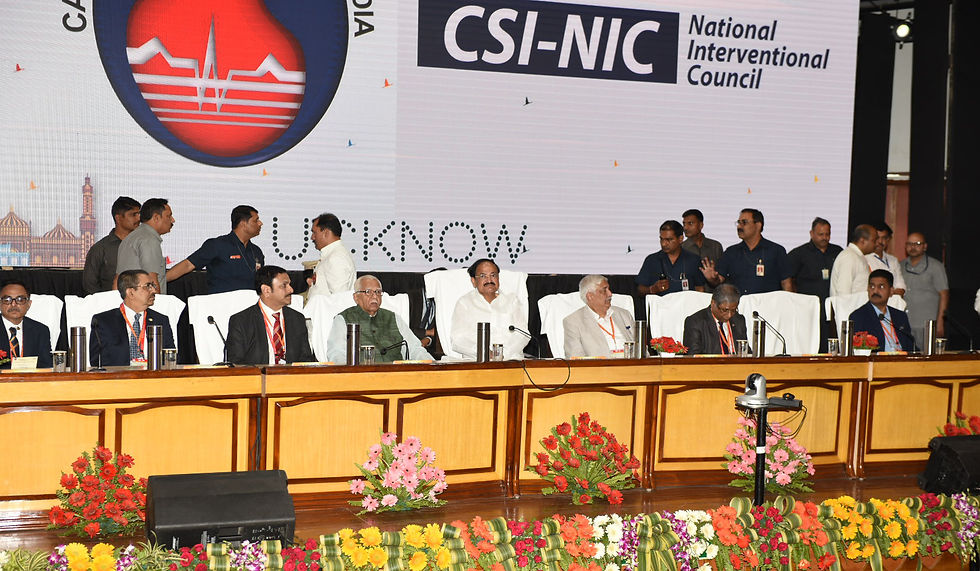Vice President expresses concern over rise in non-communicable diseases
- Sanjay Trivedi
- Apr 6, 2019
- 10 min read
The Vice President of India, Shri M. Venkaiah Naidu has described the rise in non-communicable diseases as a “deeply disturbing trend” and called upon the medical fraternity to educate the people on the dangers of leading sedentary lifestyles.

Addressing the Annual Meeting of the National Interventional Council (NIC) of the Cardiological Society of India at the Sanjay Gandhi Postgraduate Institute of Medical Sciences (SGPGIMS), Lucknow in Uttar Pradesh today, the Vice President quoting a 2017 report of India Council of Medical Research (ICMR), said that disease burden from non-communicable diseases increased from 30 per cent to 55 per cent between 1990 and 2016, while the communicable diseases dropped from 61 per cent to 33 per cent in the same period.

Pointing out that factors such as high levels of stress, increased incidence of diabetes, blood pressure, smoking, excessive consumption of alcohol, lack of exercise and lack of proper sleep were contributing to cardiovascular diseases, he said that lifestyle modification was one of the key interventions needed to prevent premature heart attacks.
Shri Naidu said that it had been proven beyond doubt that regular moderate intensity aerobic exercise like brisk walking, cycling, jogging, and swimming for five days a week would help in reducing the probability of heart disease. Observing that India stands poised to reap the biggest demographic dividend in history, he opined that a healthy and agile youth was essential to achieve its dream of inclusive and sustainable development and occupy its rightful place of leadership in the world. He stressed the need to encourage children to be physically active and be involved in sports and games right from school days to avoid NCDs.

Referring to the growing fad for junk food among youngsters, he advised them to say no to junk food as it was causing harm to their health and in turn affecting quality of life. Shri Naidu said that the nation must invest much of our resources in prevention and early detection of disease. He called for massive screening drives to identify risk factors for cardiovascular disease among people and take preventive measures.
Observing that primary health centres must serve as bulwarks in our battle against cardiovascular disease, the Vice President stressed that transforming PHCs into a robust, responsive and well equipped network of institutions was important. Mentioning that the nation has improved the penetration of healthcare services across the country, Shri Naidu said that increase in the at-birth life expectancy from around 37 years in 1951 to around 68.3 years in 2011-15 has been the most noteworthy achievement in the public health arena since Independence.
The Vice President also advised medical students to render service for at least three years in Primary Health Centres in rural areas, before taking up new assignments. Stating that India must invest more resources in R & D, he said unimaginable advancements were being made in Medical Science. “Cutting edge research in disruptive technologies such as Cybernetics and Artificial Intelligence (AI), including machine learning and augmented reality are altering the paradigms of medical science”, he added.
Calling for improving our health sector in terms of quality, accessibility and affordability, the Vice President said "Although our health care services are among the cheapest in the world, some of the life saving drugs and procedures are still beyond the reach of the common man. All the stakeholders in the health sectors need to work in synergy to health care affordable and accessible to common man". The Vice President said India must also stand out and serve as a model for quality, affordable healthcare for other nations to emulate. “I have no doubt that we have the capability to achieve this goal and more”, he added
The Governor of Uttar Pradesh, Shri Ram Naik, the Director, Sanjay Gandhi Post Graduate Institute of Medical Sciences, Dr. Rakesh Kapoor, the President (Elect), Cardiological Society of India, Dr. M.K. Das and other dignitaries were present on the occasion.

****
Following is the text of Vice President’s address:
मैं भारत की कार्डियोलाजी सोसायटी की नेशनल इंटरवेंशन काउंसिल की सालाना बैठक का उद्घाटन करते हुए प्रसन्नता अनुभव कर रहा हूं। लखनऊ के प्रतिष्ठित SGPGIMS में 5 से 7 अप्रैल, 2019 तक चलने वाली यह बैठक कार्डियोलाजी सोसायटी आफ इंडिया के उत्तर प्रदेश प्रभाग द्वारा आयोजित की जा रही है।
मुझे यह जानकर विशेष हर्ष है कि इस अवसर पर देश विदेश के विशेषज्ञ न केवल व्याख्यान देंगे और अपने अनुभव साझा करेंगे बल्कि SGPGIMS सहित देश विदेश में विभिन्न स्थानों से भी वास्तविक शल्य प्रक्रिया का प्रसारण होगा। मुझे बताया गया है कि देश विदेश के लगभग 1500 विशेषज्ञ इस आयोजन में भाग ले रहे हैं जो अपने अनुभव का लाभ साझा करेंगे।
I am delighted to inaugurate the Annual Meeting of the National Interventional Council (NIC), of the Cardiological Society of India which is being held from the 5th to the 7th of April, 2019, at the prestigious Sanjay Gandhi Postgraduate Institute of Medical Sciences (SGPGIMS), Lucknow, under the aegis of the Uttar Pradesh State Chapter of the Cardiological Society of India.
I am happy to know that the Cardiological Society of India, right from its inception in 1948, has been tirelessly championing the cause of a healthy heart for the common Indian. It is truly noteworthy that through training, knowledge exchange and skill development of over 5000 cardiologists all over the country, the fraternity is working hard to create a healthy nation.
I am told that the Society also has various Sub – specialty councils which keep track of various types of Cardiovascular Diseases and its treatment protocols, with the National Interventional Council (NIC) being premier amongst them. I am pleased to know that the NIC focuses upon newer interventional techniques which can help a patient recuperate quicker and get back to life faster, unlike conventional Cardiac procedures which come with a long recovery period.
NIC 2019, I am told, is the Annual Meeting of the Council. I am happy to know that the Department of Cardiology, SGPGIMS, headed by the Prof.PK Goel who is also the organizing chairman, is one of the premier Post Graduate Medical Research Centres in the country.
I am happy to know that the meeting would include global and Indian experts speaking on varied topics and performing live interventional procedures from abroad, and from various centres in India, including SGPGIMS. It is truly noteworthy that the conference is set to witness participation of close to 1500 delegates from different parts of the world.
I hope that the congress would be successful in helping Cardiologists to equip themselves better to meet new challenges in the healthcare sector and to give the best care to their patients at affordable rates. Esteemed members of the medical fraternity seated before me today, Let me begin by congratulating you for your great service to the nation.
India’s health sector has achieved a number of significant milestones since independence. Post-independence India’s most noteworthy achievement in the public health arena has been the increase in the at-birth life expectancy from around 37 years in 1951 to around 68.3 years in 2011-15. Although the life expectancy has increased the rise in the non communicable diseases is adversely affecting the quality of life. Infant Mortality and Maternal Mortality have been greatly reduced, diseases such as small pox and polio have been eradicated, and leprosy has been nearly eliminated. Today, the country aspires to achieve Universal Health Coverage.
We have greatly improved the penetration of healthcare services across the country, undertaken extensive health education and awareness campaigns, conducted massive sanitation drives, increased the number of government and private hospitals in India exponentially and have greatly improved immunisation.
We have survived a number of epidemics and have successfully mitigated numerous public health crises. All these achievements would not have been possible in a highly populous, resource constrained nation like India, had it not been for the selfless and dedicated service done by committed doctors and healthcare professionals such as yourself.
My dear sisters and brothers,
It is a matter of great concern that India is witnessing an epidemiological transition. Non-communicable diseases are on the increase. In a 2017 report of India Council of Medical Research (ICMR), it has been observed that the disease burden due to communicable, diseases, dropped from 61 per cent to 33 per cent between 1990 and 2016 and in the same period, disease burden from non-communicable diseases increased from 30 per cent to 55 per cent. This is a deeply disturbing trend. Heart disease is reportedly killing approximately 17 million people in the world. The death rate due to cardio vascular diseases in India rose by 34% from 1990 to 2016.
What is even more a matter of concern is the fact that that 40 per cent people in our country who develop heart attack are under the age of 55.
It has been estimated that almost 25 per cent of the people who die of heart attacks are less than 35 years of age. I understand that factors such as high levels of stress, increased incidences of diabetes and blood pressure aggravated by smoking, excessive consumption of alcohol, lack of exercise and lack of proper sleep contribute greatly to Cardio Vascular Diseases.
Life style modification is one of the key interventions needed to prevent premature heart attacks. I urge all the doctors and health care professionals present here to give primacy to educating people about changing their sedentary life styles. It has been proven beyond doubt that regular moderate intensity aerobic exercise like brisk walking, cycling, jogging, and swimming for five days a week helps in reducing the probability of heart disease. The world is now celebrating Yoga as a means to achieve physical, mental and spiritual health and wellbeing. It is an excellent stress management technique and is an effective remedy for a number of diseases, especially lifestyle related ones.
We must encourage our children to be physically active and be involved in sports and games. Initiatives of the government such as Khelo India, which aspire to mould fit and healthy individuals who would create an equally healthy society and a strong nation, will go a long way in promoting health and wellbeing of our children. We must also encourage our children to thrive on healthy food, instead of junk food that is rich in highly damaging trans-fats. I advise everyone, particularly the youngsters to say no to junk food which is causing harm to their health and affecting quality of life. Our daily diet must include plenty of vegetables, fruits, nuts, soya products and low-fat dairy products which are rich in proteins, have less fat, no cholesterol and are rich in calcium and minerals.
India today stands poised to reap the biggest demographic dividend in history. It is one of those nations of the world with a burgeoning youth population. For India to achieve its dream of inclusive and sustainable development and occupy its rightful place of leadership in the world, it is imperative that its youth population, brimming with potential, be healthy. We must therefore invest much of our resources in prevention and early detection of disease.
We must conduct massive screening drives to identify risk factors that heighten the chance of Cardio Vascular Disease among people and undertake measures to arrest the progress of the disease. Our primary health centres should serve as bulwarks in our battle against Cardio Vascular Diseases.
Dear sisters and brothers
Although our health care system consisting of Primary Health Centers, Taluk hospitals, and District hospitals is catering to the health requirements of the rural people, the need of the hour is to provide state-of-the-art healthcare facilities in the rural and remote areas as most of the modern hospitals are located in urban areas. Our efforts are also being hampered by factors such as the rapidly growing population, vast country with diverse terrain, local prejudices, superstitions and illiteracy.
While successive governments at the national and state levels have been according highest priority to the health sector, the private sector needs to supplement the efforts of the government, especially in bridging the urban-rural divide. The private sector should work with a spirit of altruism, commitment and missionary zeal in providing modern and affordable healthcare facilities in the rural areas. I encourage all the medical students I interact with, to render service for at least 3 years in PHCs in rural areas.
Our PHCs are the first point of contact with patients. A robust, responsive and well equipped network of PHCs can greatly reduce the burden on secondary and tertiary healthcare institutions by focussing on disease prevention and early detection and treatment.
My dear Sisters and brothers,
We must not falter in our response to communicable diseases either.
We must also strive to fortify our response towards medical emergencies and further strengthen our readiness to combat breakout of epidemics such as the recent Nipah virus outbreaks witnessed in Kerala. We would have to prepare ourselves to deal with a number of mutated versions of microorganisms, resistant to antibiotics and drugs that would arise due to changing climate and unprecedented levels of pollution.
India must also invest much more resources in Research and Development to keep pushing the frontiers of knowledge and keep evolving new and improved protocols for treatment of diseases. It is not sufficient to prolong the lifespan of an individual. The years of life added must also have quality and must be fulfilling. For this to happen, we must keep exploring the unexplored and be brave enough to venture into new fields of medical science. Science and technology are breaking barriers and conquering new heights all over the world. India must not miss out.
There are unimaginable advancements being made in Medical Science. Cutting edge research in disruptive technologies such as Cybernetics and Artificial Intelligence (AI), including machine learning and augmented reality are altering the paradigms of medical science. I would like to urge Doctors and medical professionals to always, resolutely follow the Hippocratic Oath and the principles of medical ethics. We must constantly strive to improve our health sector along three vectors, Quality, Accessibility and Affordability.
India is already known as the pharmacy to the world because of its good quality, affordable drugs. Although our health care services are among the cheapest in the world, some of the life saving drugs and procedures are still beyond the reach of the common man. All the stakeholders in the health sectors need to work in synergy to ensure that health care is affordable and accessible to common man. India must also stand out and serve as a model for quality, affordable healthcare for other nations to emulate. I have no doubt that we have the capability to achieve this goal and more.
We have already introduced the health insurance scheme, the largest in the world that is benefiting lakhs patients. However the need of the hour is to ensure Universal Health Coverage in letter and spirit.
We cannot rest until we secure the health of the last malnourished child and cure the last Tuberculosis patient. The task at hand is by no means an easy one.But I have full faith in the capabilities of India’s healthcare professionals.
Let me once again congratulate the Cardiological Society of India for envisioning the NIC 2019 as a platform for synthesis of new ideas. I wish the Society and this conference all the very best.
Thank You
Jai Hind!







Comments